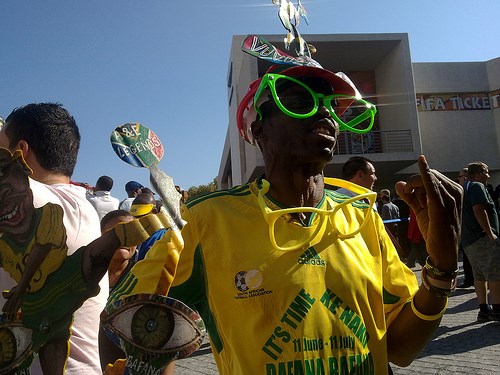Comment
The 2010 World Cup – The outsiders’ championship?

Football fans standing in line for World Cup tickets in Sandton, Johannesburg. Photo (c) flickr user Shine 2010 - 2010 World Cup good news, used under a Creative Commons 2.0 licence.
07.05.2010
There are two main reasons:
African ticket buyers?
Firstly, it appears that few Africans (outside South Africa) will get tickets to the games. This is partly because most of the tickets will be available through the Internet and partly because many of the tickets are very expensive. Only 4.7 per cent of the population in the five participating African countries (out of 32 participating countries in total) has access to the Internet.
It is, furthermore, estimated that only 50,000 Africans will come to South Africa during the championship - and that's a very optimistic estimate. To overcome the challenges of poor Internet coverage, 500,000 tickets will be sold over the counter in the 11 host cities, in 18 sales offices, and in the First National Bank of South Africa’s 600 branches. Moreover, it is possible to order by phone. Although approximately half of the tickets are sold in South Africa, ticket trouble and data problems are creating the impression that this is not a championship for the ordinary African – so far.
African coaches?
Secondly, there is only one of the African teams that have a coach from their own country and continent. Algeria has Rabah Saadane on the bench – a former player on the Algerian national team. Cameroon, Ghana, the Ivory Coast, Nigeria and South Africa all have foreign coaches. The Ivory Coast and Nigeria, for example, both have Swedish coaches (Sven Göran Eriksson and Lars Lagerbäck). This may be a sign of football's international character, but most of all it looks like the African teams do not have faith in their own abilities. The strange thing is that three of the teams have changed coach after they managed to qualify for the championship.
African champion?
African teams have never done well in the World Cup – the best ranking for a African teams is 7th place (Cameroon in 1990 and Senegal in 2002). And Egypt – who has won the African Cup seven times – has only qualified for the World Cup twice (1934 and 1990), where they ended up in a modest 13th and 20th place, respectively. With these statistics, it appears as if it is the non-African outsiders who will be victorious in the 2010 World Cup.
This article first appeared on Andreas Selliaas' blog 'Sportens Uutholdelige Letthet' in April. Follow Andreas' blog (in Norwegian) on http://sportensuutholdeligeletthet.blogspot.com/
-
Russell Holden,
Cardiff, Wales,
08.05.2010 09:32:
Sadly I have to agree with the the above entiments. Equally concerning is how Africa and its footballing teams will be portrayed by the British media. Once again the old stereotypes will be used and the understanding of the importance and potential of the game for an African audience will be lost.





